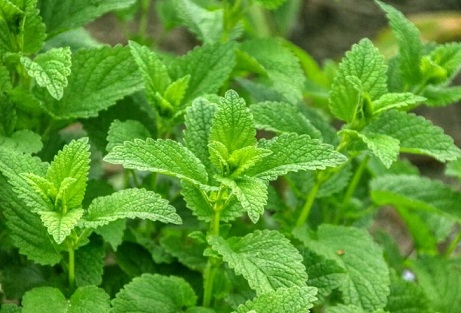Nikhil Prasad Fact checked by:Thailand Medical News Team Nov 17, 2024 1 year, 3 weeks, 6 days, 21 hours, 15 minutes ago
Herbs And Phytochemicals: A Natural Remedy with a Long History
Lemon balm (Melissa officinalis), a member of the mint family (Lamiaceae), has been valued for centuries in traditional medicine. Known for its calming properties, it has been widely used to reduce stress, promote sleep, and treat minor ailments. Originating from the Mediterranean region, lemon balm's applications have extended globally, particularly in North America, Europe, and Asia. Beyond its historical uses, modern research is uncovering its remarkable potential as a natural antiviral agent, capable of combating some of the most challenging viral diseases.
 The Antiviral Power of Lemon Balm
The Antiviral Power of Lemon Balm
This
Herbs And Phytochemicals news report highlights findings from a comprehensive literature review conducted by researchers from institutions such as the Iran University of Medical Sciences, Shahid Beheshti University of Medical Sciences, and others. Their study delves into the antiviral mechanisms of Melissa officinalis, emphasizing its potential as an affordable and accessible alternative to synthetic antiviral drugs.
The Global Impact of Viral Infections
Viral diseases account for nearly 20% of annual global deaths. Common infections like influenza and severe ones such as HIV and hepatitis claim millions of lives each year. Furthermore, viruses are linked to around 12.1% of human cancers, underscoring their widespread impact on health. Recent events, like the COVID-19 pandemic, have further emphasized the urgent need for effective treatments.
Despite the availability of antiviral drugs, their limitations are glaring. Many, including ribavirin and oseltamivir, are associated with severe side effects ranging from kidney damage to mental health disturbances. Additionally, the development of drug resistance has rendered some therapies less effective, sparking interest in safer, plant-based alternatives like lemon balm.
Key Antiviral Discoveries about Melissa officinalis
-COVID-19 (SARS-CoV-2)
Lemon balm's antiviral potential against SARS-CoV-2, the virus behind COVID-19, is a groundbreaking discovery. Researchers identified three active compounds—Luteolin-7-glucoside-3’-glucuronide, Metric acid-A, and Quadranoside-III - that directly inhibit the virus’s main protease and spike protein. These components interfere with the virus's ability to bind to human cells and replicate, demonstrating significant promise as a complementary treatment for COVID-19.
-Herpes Simplex Virus (HSV)
Herpes simplex virus types 1 and 2 (HSV-1 and HSV-2) are notorious for causing lifelong infections. Lemon balm extracts have shown exceptional efficacy against these viruses by inhibiting their entry and replication within host cells. Rosmarinic acid, a key compound in lemon balm, interacts with viral glycoproteins, disrupting their ability to adhere to and invade mucosal cells. This makes it particularly useful for patients with drug-resistant strains of HSV.
<
strong>-HIV
The HIV-1 virus, responsible for AIDS, remains a global challenge despite advancements in antiretroviral therapy. Lemon balm has demonstrated the ability to inhibit HIV-1 replication and block the virus’s integrase enzyme, which is crucial for its reproduction. Rosmarinic acid derivatives, formed under specific conditions, have been identified as potent inhibitors of viral activity, suggesting their role in reducing the burden of this disease.
-Influenza Viruses
The constant mutation of influenza viruses makes them particularly difficult to treat. Lemon balm extracts have been found effective against multiple strains, including H1N1, H3N2, and avian influenza (H9N2). Its antiviral action is multi-faceted, targeting both viral particles and intracellular replication processes. Lemon balm also enhances immune system responses, providing a double-layered defense against the flu.
-Enterovirus-71 (EV71)
This virus, commonly associated with hand, foot, and mouth disease, can lead to severe neurological complications. Lemon balm’s rosmarinic acid has shown the ability to block EV71 replication, particularly during the early stages of infection. Its effectiveness in both attachment and post-attachment phases highlights its potential in managing outbreaks of this virus.
-Adenoviruses
Adenoviruses cause respiratory and gastrointestinal illnesses and are notoriously resilient against conventional treatments. Lemon balm extracts have shown promise in reducing the impact of adenoviral infections by interfering with the virus's replication mechanisms after it enters host cells. This ability positions lemon balm as a valuable tool in managing adenoviral outbreaks.
How Lemon Balm Works: Mechanisms of Action
The effectiveness of Melissa officinalis lies in its unique phytochemical composition. Rich in essential oils (such as citronellal and geraniol) and polyphenolic compounds (including rosmarinic and caffeic acids), lemon balm exhibits multiple antiviral actions:
-Inhibiting Viral Entry: By interacting with viral proteins like glycoproteins or proteases, lemon balm prevents viruses from attaching to and penetrating host cells.
-Disrupting Viral Replication: Its compounds interfere with key enzymes and processes necessary for viral genome replication.
-Boosting Immune Responses: Lemon balm enhances the body's natural defenses, helping to clear infections more effectively.
-Neutralizing Free Radicals: Its strong antioxidant properties reduce oxidative stress, which is often exacerbated by viral infections.
Clinical Implications and Limitations
While the findings from in vitro and animal studies are promising, their translation into clinical practice requires further investigation. Human trials are necessary to determine optimal dosages, safety, and efficacy. Additionally, the precise mechanisms by which lemon balm exerts its antiviral effects remain areas of active research.
Conclusions and Future Directions
Melissa officinalis stands out as a powerful natural remedy with significant antiviral potential. Its ability to combat a wide range of viruses, including SARS-CoV-2, HSV, HIV, and influenza, underscores its value in modern medicine. The plant's affordability, accessibility, and safety profile make it an appealing option for developing countries and regions with limited access to synthetic drugs.
To harness its full potential, researchers must conduct more randomized controlled trials and detailed mechanistic studies. This could pave the way for lemon balm to be incorporated into mainstream treatment protocols, particularly as a complementary therapy for drug-resistant infections.
The study findings were published in the peer-reviewed journal: Nutrition and Metabolic Insights.
https://journals.sagepub.com/doi/full/10.1177/11786388221146683
For the latest updates on groundbreaking research and health news and more about
Herbs and Phytochemicals, keep on logging to Thailand Medical News.
Read Also:
https://www.thailandmedical.news/news/lemon-balm-s-promising-role-in-boosting-mental-well-being-and-cognitive-function
https://www.thailandmedical.news/news/french-study-finds-that-a-phytochemical-from-st-john-s-wort-shows-promise-as-a-broad-spectrum-antiviral-against-coronaviruses
https://www.thailandmedical.news/news/eucalyptus-extract-shows-promise-against-coronaviruses-and-influenza-viruses
